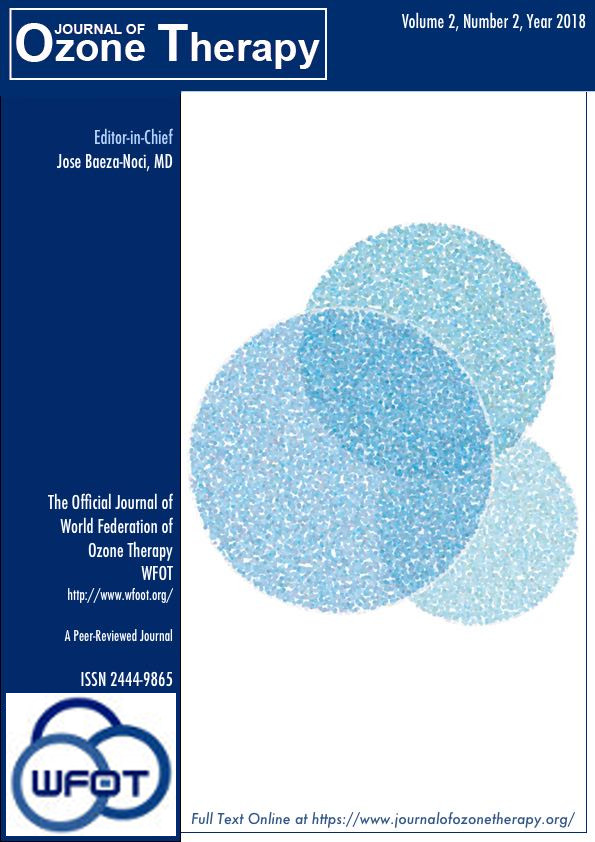Ozone therapy in oxidative stress disorders and evaluation of C-reactive proteins [abstract]
DOI :
https://doi.org/10.7203/jo3t.2.2.2018.11148Mots-clés :
ozone therapy, ozone oxidative preconditioning, antioxidant defence mechanism, oxidative stress, C-reactive proteins and HbA1c Test, Inflammation markers Résumé
Résumé
It is well recognized that oxidative stress and oxidative damage to DNA, RNA, protein and cell membranes is responsible for early ageing and lifestyle disorders. In various pathological conditions the main problem is related to a rapid increase in the cellular ROS concentration that exceeds the capacity of the cell to eliminate them. ROS derived from the ozone therapy can exert its protective effects by means of an oxidative preconditioning, stimulating and/or preserving the endogenous antioxidant systems. The aim of this paper is to evaluate the ozone effects, in a preliminary clinical treatment in the oxidative stress disorders. We enrolled 12 patients having type2 diabetes who were prone for cardiovascular risk disorders. Ozone treatment improved glycemic control and prevented oxidative stress associated to diabetes mellitus and its complications. This was also correlated with lab testing of HbA1c and C-reactive protein levels before and after Ozone treatment of 20 rectal insufflation 20 sessions (with an ozone dose of 9000mcg, ozone concentration: 30 mcg/ml) and 10 Major Auto heamotherapy (with an ozone dose of 2000mcg, with Ozone concentration: 20mcg/ml) with Rectal twice a week and M-AHT once a week.
C-reactive protein (CRP) predicts cardiovascular outcome. Oxidative stress is considered to be involved in endothelial alteration. CRP is used mainly as a marker of inflammation. Apart from liver failure, there are few known factors that interfere with CRP production. CRP levels are associated not only with clinical cardiovascular risk factors but also with oxidative stress. There are significant interrelationships among inflammation, oxidative stress, and traditional cardiovascular risk. Inflammation and oxidative stress play a key role in the pathogenesis of atherosclerosis. We examined the interrelationships among C-reactive protein (CRP), oxidative stress, and traditional cardiovascular risk factors.
Ozone treatment significantly improved the antioxidant status of patients reducing biomarkers of protein and lipid oxidation, enhancing total intracellular antioxidant status. Improvement of blood circulation and oxygen delivery to ischemic and neoplastic tissues. Improvement of the general metabolism.Correcting the chronic oxidative stress by upregulating the antioxidant system. Induce a mild activation of the immune system and Procure a state of well-being in patients by activating the neuro-endocrine system.
Conclusion.
Ozone therapy given systemically improved patient's C-reactive protein from range of 20-34 mg/dL to the range of 4-5 mg/dL. General wellbeing was enhanced with better controlled blood sugar levels. These results may be preliminary but shows the efficacy of ozone therapy in oxidative stress disorders and inflammation markers.
 Téléchargements
Téléchargements
Téléchargements
Publiée
Comment citer
-
Résumé1190
-
PDF 346
Numéro
Rubrique
Licence
Journal of Ozone Therapy applies the Creative Commons Attribution-NonCommercial 4.0 International License (CC BY NC 4.0) license to works we publish.
Under this license, authors retain ownership of the copyright for their content, but allow anyone to download, reuse, reprint, modify, distribute and/or copy the content as long as the original authors and source are cited. No permission is required from the authors or the publishers.
You may not use the material for commercial purposes.
Appropriate attribution can be provided by simply citing the original article, provide a link to the license, and indicate if changes were made.
You may do so in any reasonable manner, but not in any way that suggests the licensor endorses you or your use.




